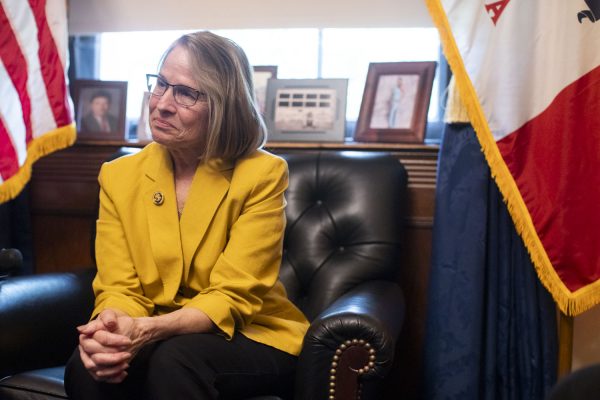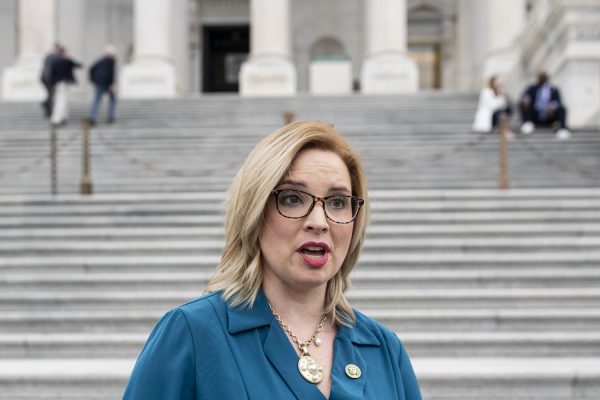Q&A | Sen. Joni Ernst talks about her work in the Senate
During an interview with The Daily Iowan Sen. Joni Ernst talked about her work on the Senate Small Business, Agriculture, and Armed Services committee and commented on Silicon Valley Bank.
Sen. Joni Ernst listens to questions from The Daily Iowan Politics Team in her office in the Russell Office Building in Washington D.C. on Wednesday, March 29, 2023.
March 29, 2023
WASHINGTON — The Daily Iowan was in the nation’s capital Monday, where reporters met with U.S. Rep. Ashley Hinson and asked her about Parental Rights, Bipartisanship, and Student Loans.
Editor’s Note: This Interview is edited for length and clarity.
The Daily Iowan: Yeah, I guess just to kind of jump off, I’m just kind of looking at how this is another year where the Senate, the Republicans in the Senate are in the minority, however, the Republicans in the House are in the majority. So how does that kind of work with what you do how do you kind of get Iowans like voices and opinions kind of out on the floor?
Joni Ernst: I think in the Senate because I am in the minority party right now. It’s just important to continue to work on relationships and the United States Senate, and be blessed. I’ve been here now in my second term. And so there’s a lot of really great relationships that I have with Democrats that are in the majority party, and so they can help move legislation.
So working on those relationships, there’s a number of them, that will be really important, of course, for Iowa, my colleagues that are on the Armed Services Committee, those that are on the Agriculture Committee, and those that are on the Small Business Committee. Those are all important areas in which I serve. So people like Ben Cardin, who’s the chairman of the Small Business Committee, he’s a Democrat from Maryland. We’re working really close together on Small Business Administration reauthorization, Debbie Stabenow of Michigan is the chairwoman for, for agriculture committee, and we’re working on a farm bill, which is largely bipartisan, but it’s all of these relationships that that we work on, and we develop that help us get our legislation over the finish line.
So regardless of what state we’re in, we all should have really strong relationships. And so that’s, that’s what I like to work on.
The DI: Yeah. And you just mentioned this, briefly about the farm bill, as one piece of bipartisan legislation. What are some other kinds of pieces of legislation going through that you think Iowans should know about that you really think will affect Iowa?
Ernst: As we look at the farm bill, it is very important. And within the Farm Bill, you’ll find many of our individual bills get wrapped up into that. So that will be an overall important piece of legislation for Iowans.
But if you look at a small business as well, I have a number of bipartisan solutions for issues in the small business community. Probably top of mind when I talk to small businesses is childcare. And how as a small business, can we get more employees? Part of that is childcare.
So Jackie Rosen was Democrat from Nevada, she and I have an initiative for nonprofit or religious organizations, allowing them access to Small Business Administration loans, that would help our childcare deserts.
So there are a lot of different bipartisan pieces of legislation that we have that address issues that Iowans have raised as I travel, of course, every year from the river to river and covering down on all these counties. And I’m just hearing about those challenges. And then I find really great partners here that helped me with those initiatives.
The DI: Yeah, and I guess, what are some ways that you can kind of bring, like rural America, in like to the Senate?
Ernst: And there, there are a lot of ways to do that. And first and foremost, of course, will be the Agricultural Committee. And it’s really interesting because not everyone that serves on the committee actually comes from a rural community.
But if you look at the SNAP aspect, if you look at just feeding and making sure that vulnerable families are taken care of, there are other partners that are willing to listen, like Cory Booker, who is from New Jersey.
He is a jersey guy who grew up in the city, but he’s on the Ag Committee. And so when he wants to know about rural issues in Iowa, we have that avenue of serving on the committee together.
You know, he may want one piece of legislation that supports snap, and I might want a piece of legislation that helps rural development. And so we asked each other questions about that, and he’s happy to support me if I can be supportive of some of his initiatives, too.
So I think just working together through some of these communities or these committees, it’s not really Republican versus Democrat. It’s maybe more rural versus urban. And we have to be able to share information about our home states and our home communities. And then they will give you a voice as well.
The DI: I guess kind of one last question on this topic was just with, with the Republicans being in the majority in the House. How do all the Iowa delegates kind of work together? When, like, say, like, you kind of want specific legislation has done, like, and so you can go talk hop over to the, our house people over there?
Ernst: Right. And it’s pretty remarkable because this is the first time since the 1950s. I think that we’ve had an all-Republican delegation. So it’s great that I can turn to those members and say, ‘this is what I’m working on in the Senate, will you run a companion bill in the House.’ It’s nice to have those conversations.
One thing I started when I first came into the Senate was a delegation breakfast, and we meet every couple of months just to talk over different initiatives. And, of course, back in that day, it was bipartisan.
So we kind of pick and choose legislation we could work on together. But now that we have an all-Republican delegation, you have four more members in the House, you know, of those members, you can shop different pieces of legislation and find the right appropriate committees that they might be on to support those initiatives. It’s been pretty rewarding.
The DI: Yeah, and our next topic is actually about a press release we got today from I believe it was Grassley, about the student loan forgiveness and the piece of legislation he just joined you on. And I’m wondering if you could just talk a little bit about that bill, as well as your thoughts on Biden’s student loan forgiveness plan in general?
Ernst: And we’re trying to push back against that. There is some constitutionality, issues surrounding that, and differing opinions on whether President Biden is actually able to use executive orders to do that, we will expect the Supreme Court to make a decision on that as well.
But overall, what we want to do is push back and say one, we can continue with forgiveness of student loan debt just outright through the President, as well as we can’t continue to delay the payment of student loans. So it’s twofold there.
So just simply say we’re we as Congress are not going to allow that any longer. We know that we’re moving on as the COVID pandemic is ending title 42 at the border.
The President has long said that the COVID emergency order is over. So our policies need to reflect that as well.
The DI: And then moving on to sort of a different topic. I know you touched on this a bit earlier. But as you said, you’re on a small business committee, and you’re also on the Armed Services Committee. I’m wondering, in any of those committees, is there anything you’re working on right now that you believe is a priority for you as a senator? And just what’s going on right now?
Ernst: Priorities with small business, I taught the child care piece, which I think is really, really important.
But overall, looking at the reauthorization of the Small Business Administration, what we want to do is look at how regulations are affecting small businesses, because one of the issues that I hear from a small business in Iowa is that a lot of these federal regulations that come out and they’re great for corporations, but you try and apply the same standard to a small business that may only have three to five employees.
They don’t have attorneys, they don’t have tax consultants that can work these issues. So making sure that government regulation is right-sized and appropriate for those industries, that absolutely is a priority.
Working on some of the other issues, I mentioned childcare, but ways that we can ease that burden and help small businesses find employees. So whether it’s training initiatives, whether it’s simply getting people back into the workforce, what are the avenues that we do that, and then making sure that we are modernizing the SBA, and again, right-sizing the SBA as well.
A young woman that I had here in DC for the President’s State of the Union. She is a young female entrepreneur from Cedar Rapids. And when we were talking about modernizing SBA, she was laughing about it because she said she was trying to apply for some of the SBA programs, and she said she literally was required to fax in her application to the Small Business Administration. And she said I don’t own a fax.
So yeah, I mean, we’ve got to bring it up to today’s standards of, you know, do it electronically, whatever it is, we’ve got to figure out how to make it easier for small business.
The DI: Yeah, I guess, is there anything else in the Armed Service? Anything in the Armed Services Committee that you’re currently working on right now you think is a priority?
Ernst: Yes, there are a number of priorities. One is working with the Iowa Army Ammunition Plant. And we are trying to develop another line for producing munitions.
We’ve seen the extreme need to be able to produce munitions, especially with what we see going on in Ukraine. The Iowa Army Ammunition Plant is one of the only plants, we’re the only plant until recently that packed and past 155 howitzer rounds. And so we want to make it faster to produce those. So that is something that we are prioritizing. We’re speaking to the army about this.
And then recruiting, obviously, recruiting is a big issue right now with our armed services, and finding out how we can really encourage young men and women to join the military and find out what will motivate them to join the military.
The DI: Do you know why necessarily that recruiting has been difficult?
Ernst: Well, because one, our pool of applicants that actually qualify for military service is much, much smaller than it ever has been in our history. Only about 23% of the 18 to 24-year-olds who qualify will qualify meaning that they pass the educational requirements and can pass the mental qualifications, physical qualifications and that’s not easy. Some of them also will have criminal histories that disqualify them from service.
So understanding that that pool is getting much smaller, how do we motivate people and of the 23% that do qualify for military service? And I’m not going to quote an exact percentage, because I don’t know if it’s right, but it is such a small percentage actually do want to serve. So how can we make it more appealing for young Americans to serve their country?
The DI: Do you have any ideas right now on how to make it more appealing?
Ernst: Well, we have heard, there was a survey that was done through the DOD, not all that long ago. When the respondents when came back, they did say that base pay is an overall factor.
When you look at our requirements, what we expect young men and women in service to do, the long hours, the deployments, and things like that. The argument that we’ve heard is that they’re not paid as much as maybe they should be.
When you look at young people today, they can go to maybe a Scooter’s coffee shop, or they can work at a convenience store for probably more than a young private going into the army base. So it’s a struggle to be able to pay them what we truly do believe is a valuable service.
The Di: In your experience, when kind of just your own, like experience serving like, like kind of looking at the young people that do want to or maybe could serve today. Have you seen that when there is a kind of conflict like there is in Ukraine? Does that? Like does that increase people’s like? Like, like them wanting to serve, or do you think it decreases?
Ernst: Well, I don’t know that Ukraine might be the right example. We did see it a lot on the news. And I know that there were a lot of young people that saw the horrific actions the Russians were doing. And Ukraine, you know, they were killing children. They were killing innocent civilians. The Russians were they Russians were using rape as a means of terrorizing communities. And I think young people respond to that and they see that and they say, That’s horrible.
That shouldn’t happen. But I don’t know that it necessarily wants to mobilize them to want to serve. I saw a statistic earlier today that a lot of young people don’t believe that patriot Saddam is an important part of their life.
And I want young people to know and understand we live in such an incredible country, an incredible country. And this country gives opportunities to everyone, regardless of who you are, whether you’re straight or gay, whether you’re black or white, there’s incredible opportunity out there.
And you don’t find those same opportunities in other countries. So I hope that we can get back in the next several years or so understanding what wow, I live in a great country, and I want to support my country in this way. I don’t see that level of patriotism right now. But I hope in some sense, we see that return in the future, and then maybe more young men and women want to say, Wow, I value this country. I want to defend these values.
The DI: Just have one more quick question. Okay, the last question, changing topics. One more time is with the Silicon Valley Bank labs, people have talked about, you know, with the loosened regulations that are put in place for small and medium bakes into banks in 2018. Do those need to change back to more? There’s more oversight over them, and they have more regulations? And I’m wondering, in your opinion, is there anything Congress? Do you think Congress needs to do anything to prevent stuff like the Silicon Valley Bank collapse is happening?
Ernst: Yeah, I do think that one, we need to step back first as Congress, and really pay attention to what we’re finding out about the regulators. So I don’t want to see any knee-jerk reactions, because I don’t serve on the banking or finance committees.
But what I have been hearing is that there still were the appropriate regulations in place. But the regulators were not following those regulations, with the Fed, increasing their rates.
There was a lot of risky behavior that was going on in SBB. So it wasn’t necessarily an issue of regulations. It was an issue more so of risky behavior. Within that one bank. They went into this knowing that only about 6% of the investment that went into that bank was insured 6%, which tells me right away that that’s, that’s a bad business proposal right there.
So there’s more to follow on that. Not saying that there shouldn’t be follow-up in the future. Yeah, we need to hear from those regulators. We need to hear from more people about what happened if there were bad behaviors and risky behaviors there. And if the regulators didn’t actually flag that risky behavior if they weren’t doing the appropriate stress tests for that particular bank.
So more to follow on that. I don’t want to comment until I know what happened.
Hannah Pinski, Ashley Weil, Lauren White, and Emily Nyberg helped contribute to this report.















